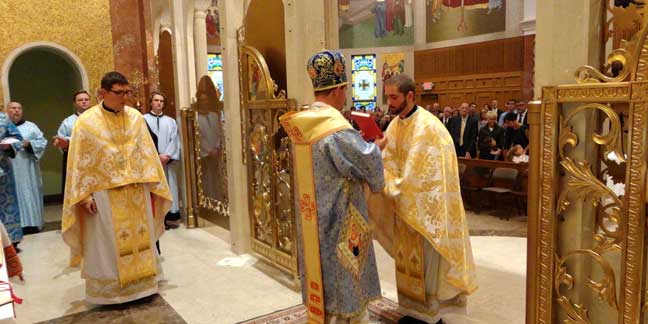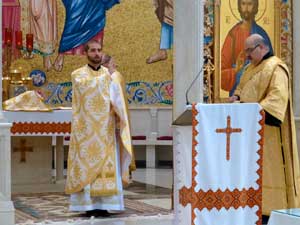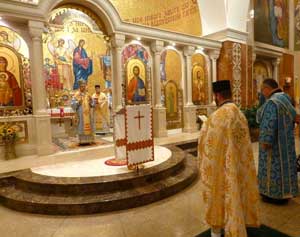 ‘This experience is deeply enriching my priesthood, imbuing within me a spirit of the catholicity of the Church.’
‘This experience is deeply enriching my priesthood, imbuing within me a spirit of the catholicity of the Church.’
CHARLOTTE — Father Joseph Matlak, 31, is celebrating his one-year anniversary of ordination as a priest of the Ukrainian Greek Catholic Church. He has recently been named administrator of the St. Basil Ukrainian Greek Catholic Mission and chaplain of Holy Trinity Middle School.
Father Matlak has a unique priesthood, as he has permission to celebrate Holy Mass (also called Divine Liturgy) in three rites: the Byzantine rite and the two forms of the Latin rite. He celebrates Mass in the Extraordinary Form (Latin Mass) at St. Thomas Aquinas Church and in the Ordinary Form (Novus Ordo) at the middle school.
He is also married, as Eastern Rite Catholic married men may be considered for ordination at their bishop’s discretion. Father Matlak and his wife Katie Ann were married in 2014.
Father Matlak expressed that he is grateful to Bishop Peter Jugis and the entire Diocese of Charlotte for “their unparalleled cordiality and hospitality. I have been received as though being one of their own, who works and strives together with them for the same goal, the glory of God and the good of His people!”
Recently we asked Father Matlak to share his vocation story with the Catholic News Herald:
CNH: Can you share some information on your background?
FATHER MATLAK: I was born on March 2, 1985, in Dunstable (Bedfordshire), England, but spent much of my childhood growing up in London Colney and Saint Albans (Hertfordshire), England. I am a cradle Catholic, born of a Ukrainian father and a Portuguese mother, both of whom were devout and practicing Catholics.
CNH: When did you realize you had a call to the priesthood?
FATHER MATLAK: I share one thing in common with St. John Paul II. We wanted to become actors before we thought about the priesthood. Nevertheless, throughout my teenage years, I always enjoyed reading theology, and I remember wanting to study theology at the university level since the age of 12.
A significant event in my early teenage years was when my father became very ill. He died in the early hours of the morning, while I was holding him in my arms and feeling his last gasps of breath upon my face. If I may be permitted to say, it was a very good and holy death. He had received the sacraments, and his family surrounded him – mourning, yes – but, most importantly, praying.
After his death, I gave myself to studying and understanding the teachings of the Catholic Church. I thoroughly enjoyed my secondary religion classes, beginning with the Gospels and then philosophy and ethics. The turning point occurred when I was 16 years old. I went on a long summer vacation to the Portuguese island of Madeira, where my mother was born and grew up. Her native village is situated high up in the mountains, and our house was within walking distance of a convent of the Poor Clares of Perpetual Adoration. I often descended those hundreds of steps, in order to visit the chapel.
I recall one day going to pray before the Lord, when, as I was leaving, I heard a high-pitched female voice that summoned my attention (and probably the rest of the village, too). It was Sister Rosa, the only one with permission to speak with guests. She asked me to come back and have a chat with her. During the course of that conversation, she advised me to return home and ask my mother’s permission to enter the seminary. I was certainly not going to upset her by saying “no” directly, and so I smiled and went on my way.
On the very next day, my aunt and I visited Funchal, the capital city of Madeira. I asked her to take me to the cathedral for daily Mass, and we stumbled in upon a priestly ordination. We remained long enough to obtain the first blessing from one of the newly ordained priests.
For the next few weeks, as I was returning to England from the summer vacation, I felt very bothered by the idea that God might be calling me to the priesthood after all. I tried my very best to ignore it, but could not quite shake the thought.
One evening, I attended Benediction of the Blessed Sacrament in a neighboring parish. A devout Catholic laywoman gave me one of her books to read. I was mesmerized by a chapter describing the journey of the soul, and, in particular, by one paragraph that outlined the importance of following a vocation from God. She wrote that people could do a thousand good things in life, but that they would never bear as much fruit as they would if they were to follow their vocations.
Very shortly thereafter, I was sitting in history class, staring at the crucifix on the wall behind the teacher’s desk. In my head, I began saying “Fine, I’ll do it – just leave me alone!” From that very moment onwards, I felt enormous interior peace.
For the next two years, I encountered either discouragement or outright opposition from some of my teachers, but my family supported and encouraged me. One family member asked me, “Who is going to take care of your mother?” But I remember my mother replying, “You must go, if God is calling!”
After secondary school, I pursued undergraduate studies in ancient history at King’s College London, where I took a special interest in Byzantine history and theology. There I encountered many Eastern Orthodox and Eastern Catholics, who helped me to appreciate and learn about that part of my heritage that was kept from me – and I have been discovering more and more people with a similar story.
That time in my life was also pivotal in the decision to discern my priestly vocation within the context of the Eastern Churches.

 CNH: Where did you attend seminary?
CNH: Where did you attend seminary?
FATHER MATLAK: I resided at St. Josaphat Seminary in Washington, D.C., while pursuing seminary studies in philosophy and theology at the Catholic University of America in Washington, D.C.
CNH: Where/when were you were ordained and by whom?
FATHER MATLAK: I was ordained at St. Josaphat Cathedral in Parma, Ohio, on Oct. 1, 2015, by Bishop Bohdan Danylo, the bishop of the Eparchy of St. Josaphat in Parma.
CNH: Can you explain what it means to be tri-ritual, to be able to celebrate the Mass in three rites?
FATHER MATLAK: I am a canonically a priest of the Ukrainian Greek Catholic Church, the largest of the Eastern Churches in full communion with the Church of Rome. I have also received faculties from the Congregation of the Eastern Churches to celebrate in the Latin rite. This means that I have permission to celebrate in both the Byzantine rite and Latin rite, of which there are two forms – the Ordinary Form and the Extraordinary Form (Missal of 1962). As a result, I find myself celebrating the Liturgy/Mass in three different rites or forms, depending upon the place and situation. This experience is deeply enriching my priesthood, imbuing within me a spirit of the catholicity of the Church.
CNH: What do you enjoy most about your priestly ministry?
FATHER MATLAK: In the priesthood, no two days are ever the same. Like any adventure, there are difficult climbs to endure, and there are pleasant valleys to admire. I am happiest at the altar of God and in that most happy ministry of the confessional. I am happy teaching in the classroom, and being there to guide a person who wants to learn more about the Church and her faith. I enjoy the fraternity among priests, whose hearts burn for the salvation of souls, as does mine.
CNH: What it is like to be a married priest?
FATHER MATLAK: According to the tradition of the Eastern Churches, a candidate for major orders has to be married before ordination to the diaconate. It is not that “priests can get married,” as is commonly assumed, but rather that married men are ordained to the priesthood.
In Eastern Christianity, monasticism is a vocation held in very high esteem. Those who discern celibacy commonly seek out a monastic community. However, after having met my wife in church, I realized that God was calling me to marry, and specifically to marry her. Thereafter, the bishop decides whether or not to ordain a married man. I may never have been ordained, and so the important thing was to discern whether or not I was called to marriage first.
My wife had not grown up in the Eastern Churches, although she was aware of them through her experience at the Franciscan University of Steubenville. Ironically, she never thought she would be married to a priest. She recalls at one point emphatically telling the wife of a priest that she would never do so! As it turned out, she became my biggest champion, often encouraging me whenever I wanted to doubt that I even had a priestly vocation. (I have found that this is a common story among the wives of our priests and deacons.)
The most important thing to understand is that this is a divine vocation. It is not enough simply to “find a wife” before ordination, but rather to find the right person to marry. In our case, we both began praying for our future spouses at around the same time, and specifically to the Mother of God. While not being a priest herself, the wife of the priest certainly shares to some extent in the priestly life and ministry of her husband. She is traditionally an esteemed and revered member of the parish, and very often takes on positions of leadership and service in accordance with her abilities and talents. Therefore, it is no wonder that the wife of a priest has traditionally been given a title (Pani Dobrodyka, Pani Matka, Matushka, Presbytera, Khouria).
The Code of Canons of the Eastern Churches is clear that a priestly family is called to shine forth as an example of virtue among the Christian faithful. People look to us, in order to see how we pray, how we honor and respect one another, how we raise our children, how we serve those around us, how we image the divine plan for marriage and the family. It is impossible for me to preach something from the pulpit, and then to be unfaithful to it during the rest of the week. My own homily serves as my conscience!
As with any marriage, this is a school of martyrdom (witness) and sanctification, and, as such, it is a vocation that is simultaneously joyful and challenging. But most importantly, it is a place where divine grace is very powerfully present, because it helps us put off the “old man” of pride and selfishness, and put on the “new man” of selflessness and service.
CNH: What is something people would be surprised to know about you?
FATHER MATLAK: I wanted to be an actor. I learned to play the guitar. I earned my black belt in Shotokan karate at the age of 11. I learned ballroom dancing.
CNH: Your one-year anniversary of ordination is this month. What is the biggest lesson you have learned during your first year of priesthood?
FATHER MATLAK: After the consecration in the Byzantine Rite of Ordination, the bishop breaks a particle of the Host and places it in the hands of the newly ordained priest. He then instructs the new priest to look after it with his life, for one day God will demand an account of the portion of the Church entrusted to him. The new priest then goes to the back of the altar, bows his head upon it, and meditates upon this awesome responsibility until time for Holy Communion.
The priestly vocation is masterfully designed to break a man of his pride and selfishness. Divine grace heals what is lacking within the priest, so as to mold him into the likeness of the image of God and of Christ the High Priest.
CNH: What advice would you give to a man discerning a vocation to the priesthood?
FATHER MATLAK: If you think God might be calling you to the priesthood, you will only discover the divine purpose for your life if you focus entirely upon God and the kingdom of heaven. Do not overly delay in pursuing this glorious vocation, because so many distractions and temptations are capable of making us abandon the path that God has designed especially for us. There are so many souls out there in need of a priest. Give, give, give, and you will receive a hundredfold in return!
— SueAnn Howell, senior reporter
Pictured: At his ordination Oct. 1, 2015, Father Joseph Matlak receives the Liturgikon, the official English translation of the Divine Liturgies, from Bishop Bohdan Danylo, the bishop of the Eparchy of St. Josaphat, during Divine Liturgy (Mass) at St. Josaphat Cathedral in Parma, Ohio. (Photos provided by Deacon Matthew Hanes)


